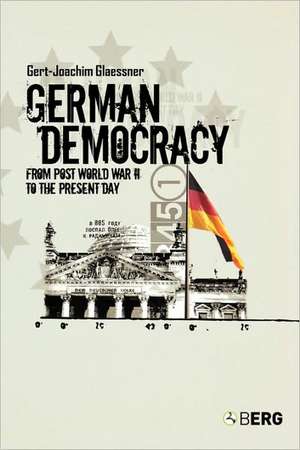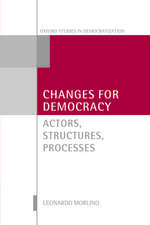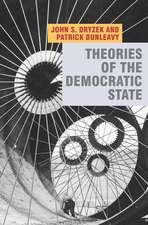German Democracy: From Post-World War II to the Present Day
Autor Gert-Joachim Glaessneren Limba Engleză Paperback – 31 iul 2005
| Toate formatele și edițiile | Preț | Express |
|---|---|---|
| Paperback (1) | 231.63 lei 6-8 săpt. | |
| Bloomsbury Publishing – 31 iul 2005 | 231.63 lei 6-8 săpt. | |
| Hardback (1) | 715.08 lei 6-8 săpt. | |
| Bloomsbury Publishing – 31 iul 2005 | 715.08 lei 6-8 săpt. |
Preț: 231.63 lei
Nou
Puncte Express: 347
Preț estimativ în valută:
44.35€ • 45.70$ • 37.22£
44.35€ • 45.70$ • 37.22£
Carte tipărită la comandă
Livrare economică 21 februarie-07 martie
Preluare comenzi: 021 569.72.76
Specificații
ISBN-13: 9781859738764
ISBN-10: 1859738761
Pagini: 288
Ilustrații: bibliography, index
Dimensiuni: 156 x 234 x 16 mm
Greutate: 0.39 kg
Editura: Bloomsbury Publishing
Colecția Berg Publishers
Locul publicării:London, United Kingdom
ISBN-10: 1859738761
Pagini: 288
Ilustrații: bibliography, index
Dimensiuni: 156 x 234 x 16 mm
Greutate: 0.39 kg
Editura: Bloomsbury Publishing
Colecția Berg Publishers
Locul publicării:London, United Kingdom
Caracteristici
Also available in hardback, 9781859738719 £50.00 (August, 2005)
Notă biografică
Gert-Joachim Glaessner is Professor of German Politics at Humboldt University, Berlin.
Cuprins
1.1949 and 1989 - New Democratic Beginnings and ContinuityPost-war Germany and the Foundation of two German StatesThe Federal Republic and the GDR as Political and Societal AntipodesThe Second Foundation of the Federal Republic2.Constitutionalism and Constitutional Politics in GermanyThe Basic Law of 1949Constitutional Basics of the Federal Republic's Political OrderBasic Rights and the System of Values (Werteordnung) of the Basic LawThe 'Free Democratic Basic Order'Guiding Principles of the System of GovernmentDemocracy and the Basic Law3.The Constitution of the United GermanyThe Quest for Reunification in the Basic LawConstitutional Reform or Continuation of the Basic Law?Constitutional Provisions of the Unification TreatyConstitutional Amendments after Unification4.West and East: Germany in EuropeThe Question of SovereigntyThe Politics of IntegrationDeutschlandpolitik and OstpolitikThe Aims of DeutschlandpolitikThe Path to German UnityThe New Germany and the European Order5.The System of GovernmentThe Federal StructureThe Constitutional BodiesThe Central Role of ParliamentThe Executive and Public AdministrationThe Constitutional and Political Role of the German ChancellorChecks and Balances: The Federal Constitutional CourtExternal Actors: Organised Interest GroupsExternal Actors: The Media6.Elections, Coalitions, and Coalition GovernmentsThe Electoral SystemFederal Elections 1949 - 2002Coalitions and Coalition GovernmentsChancellor Democracy and Party Government - from Adenauer to Schrder7.The German Party SystemThe Constitutional Role of Parties in the Basic LawThe Party System of the 'Old' Federal RepublicA Brief Portrait of the Major German Parties The Christian DemocratsThe Social DemocratsThe LiberalsThe GreensThe Establishment of a New Democratic Party System in East Germany (1989-1990)The German Party System After Unification8.The Power Structure of the GDRDictatorship of the Proletariat or Socialist Democracy?The Creation of a Socialist System in East GermanyOvercoming StalinismTechnocratic Reforms in the 1960sThe Honecker EraThe Collapse of the Old RegimeThe End of the State Party SEDStructural Defects of the Communist System9.The German Revolution of 1989 and German UnificationHave the Events of 1989 been a Revolution?Collapse and a New Beginning - the Citizens' Movements and Democratic TransitionDual Rule: The Old Regime and the New Political ForcesThe First Democratic Elections in East GermanyThe Controversy About a New Constitution for the GDRThe Treaties of German UnificationHow to Unite Two Different Social and Political Systems?10.Political Culture United?Political Culture in West-GermanyThe Socialist Political Culture of the GDRThe Political Culture of RevoltPolitical Culture in United GermanyDocumentsThe Basic Law of the Federal Republic (Excerpts)Treaty of 31 August 1990 between the Federal Republic of Germany and the German Democratic Republic on the Establishment of German Unity - Unification Treaty (Excerpts)Treaty of 12 September 1990 on the Final Settlement with Respect to Germany (2 plus 4 Treaty)
Recenzii
The particular strength of the book lies in its analysis of the constitutional structures and the absorption of German sovereignty into the European Union. Glaessner also considers the weight of the sweeping changes in German politics, society and, in particular, political culture. It is an authoritative account of how post-World War Two Germany developed into a stable constitutional democracy.' Peter H. Merkl is Professor Emeritus, University of California, Santa Barbara and author of numerous books including 'The Federal Republic of Germany at Fifty'.'Glaessner's authoritative study will be essential reading for anyone seeking a deeper understanding of how contemporary Germany, scarred by its Nazi past and the bitter divisions of the Cold War, succeeded in establishing a strong, widely admired democracy capable of coping with the multiple and often troubling challenges of unification.' Ian Wallace, Professor Emeritus of German, University of Bath 'Provides a keen, wel
















